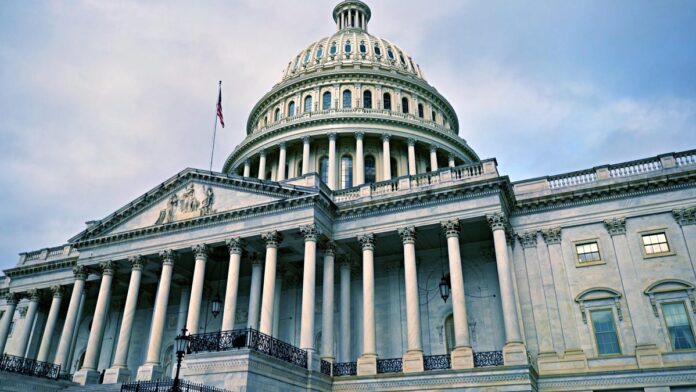Till now, the Trump administration’s tax invoice — additionally referred to as its “huge, lovely invoice,” which handed within the Senate on Tuesday — included a rule that may forestall states from imposing their very own AI laws for 5 years, and would withhold as much as $500 million in funding for AI infrastructure if states do not comply.
On Tuesday, a day right into a “vote-o-rama” that started Monday in an effort to go Trump’s tax invoice earlier than the July 4 vacation, the Senate voted 99 to at least one to take away the proposed moratorium on states’ means to manage AI. The vote got here simply days after senators had amended the unique proposal of a 10-year ban on enforcement to 5 years and added exemptions for state legal guidelines concentrating on unfair or misleading practices and youngster sexual abuse materials (CSAM).
The preliminary model of the rule additionally made $42 billion in broadband web funding depending on states’ compliance with the 10-year ban. The amended model solely held $500 million in AI funding for ransom if states disobeyed.
The proposed moratorium
If handed, the rule would have prohibited states from imposing AI laws for 5 years and concurrently put AI funding for states in limbo. It would not have solely affected in-progress laws; legal guidelines that states had already handed would keep intact in writing however would successfully be rendered ineffective, lest states need to put their AI funding on the road.
In apply, this may create a patchwork imbalance throughout the nation: Some states would have thorough laws however no funding to advance AI safely, whereas others haven’t any regulation however loads of funding to maintain up within the race.
“State and native governments ought to have the precise to guard their residents in opposition to dangerous know-how and maintain the businesses accountable to account,” stated Jonathan Walter, a senior coverage adviser at The Management Convention’s Middle for Civil Rights and Know-how.
Many advocates fought to get the ban faraway from the tax invoice and celebrated the information on Tuesday, together with Adam Billen, vp of public coverage at Encode, a Washington, D.C.-based accountable AI group.
“40 state AGs, 14 governors. 260 state lawmakers from all 50 states, a number of 140+ org coalition letters we rallied, 1000’s of calls and emails from dad and mom and constituents, and some key Congressional champions later, and we’ve got it practically fully killed,” he stated in a LinkedIn put up. “Even the availability’s main sponsors voted to strip it ultimately.”
Federal AI coverage stays unclear
The administration is because of launch its AI coverage on July 22. Within the meantime, the nation is successfully flying blind, which has prompted a number of states to introduce their very own AI payments. Below the Biden administration, which took some steps to manage AI, states have been already introducing AI laws because the know-how advanced quickly into the unknown.
Walter added that the vagueness of the ban’s language may have block states’ oversight of non-AI-powered automation as effectively, together with “insurance coverage algorithms, autonomous car techniques, and fashions that decide how a lot residents pay for his or her utilities.”
“The primary situation right here is that there are already actual, concrete harms from AI, and this laws [would] take the brakes away from states with out changing it with something in any respect,” stated Chas Ballew, CEO of AI agent supplier Conveyor and a former Pentagon regulatory lawyer.
By stopping states from imposing particular person AI coverage when federal regulation remains to be a giant query mark, the Trump administration would have opened the door for AI corporations to speed up with none checks or balances — what Ballew referred to as a “harmful regulatory vacuum” that may give corporations “a decade-long free go to deploy probably dangerous AI techniques with out oversight.”
President Trump’s second time period so far does not imply AI security is a precedence for federal regulation. Since January, the Trump administration has overridden security initiatives and testing partnerships put in place by the Biden administration, shrunken and renamed the US AI Security Institute the “pro-innovation, pro-science” US Middle for AI Requirements and Innovation, and minimize funding for AI analysis.
“Even when President Trump met his personal deadline for a complete AI coverage, it is unlikely that it’s going to significantly handle harms from defective and discriminatory AI techniques,” Walter stated. AI techniques used for HR tech, hiring, and monetary functions like figuring out mortgage charges have been proven to behave with bias towards marginalized teams and might show racism.
Why states need their very own AI regulation
Understandably, AI corporations have expressed a choice for federal regulation over particular person state legal guidelines, which might make sustaining compliant fashions and merchandise simpler than attempting to abide by patchwork laws. However in some instances, states might have to set their very own rules for AI, even with a federal basis in place.
“The variations between states with respect to AI regulation replicate the totally different approaches states should the underlying points, like employment legislation, shopper safety legal guidelines, privateness legal guidelines, and civil rights,” Ballew factors out. “AI regulation must be integrated into these current authorized schemes.”
He added that it is sensible for states to have “a variety of regulatory schemes,” because it “promotes accountability, as a result of state and native officers are closest to the individuals affected by these legal guidelines.”
Earlier proposals withheld web funds
Broadband Fairness, Entry, and Deployment (BEAD) is a $42-billion program run by the Nationwide Telecommunications and Data Administration (NTIA) that helps states construct infrastructure to increase high-speed web entry. Earlier than it was revised, the Senate rule would have made all of that cash, plus $500 million in new funding, contingent on states backing off their very own AI legal guidelines.
Get the morning’s high tales in your inbox every day with our Tech At present e-newsletter.

